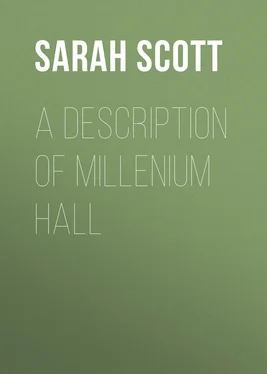Sarah Scott - A Description of Millenium Hall
Здесь есть возможность читать онлайн «Sarah Scott - A Description of Millenium Hall» — ознакомительный отрывок электронной книги совершенно бесплатно, а после прочтения отрывка купить полную версию. В некоторых случаях можно слушать аудио, скачать через торрент в формате fb2 и присутствует краткое содержание. Жанр: foreign_prose, foreign_antique, на английском языке. Описание произведения, (предисловие) а так же отзывы посетителей доступны на портале библиотеки ЛибКат.
- Название:A Description of Millenium Hall
- Автор:
- Жанр:
- Год:неизвестен
- ISBN:нет данных
- Рейтинг книги:4 / 5. Голосов: 1
-
Избранное:Добавить в избранное
- Отзывы:
-
Ваша оценка:
- 80
- 1
- 2
- 3
- 4
- 5
A Description of Millenium Hall: краткое содержание, описание и аннотация
Предлагаем к чтению аннотацию, описание, краткое содержание или предисловие (зависит от того, что написал сам автор книги «A Description of Millenium Hall»). Если вы не нашли необходимую информацию о книге — напишите в комментариях, мы постараемся отыскать её.
A Description of Millenium Hall — читать онлайн ознакомительный отрывок
Ниже представлен текст книги, разбитый по страницам. Система сохранения места последней прочитанной страницы, позволяет с удобством читать онлайн бесплатно книгу «A Description of Millenium Hall», без необходимости каждый раз заново искать на чём Вы остановились. Поставьте закладку, и сможете в любой момент перейти на страницу, на которой закончили чтение.
Интервал:
Закладка:
In this resolution she discharged the only servant she kept, delivered up her house to her landlord, and after having settled all her pecuniary affairs, she set out on her journey with her little charge; but grew so ill on the road that she desired to be set down at the first inn; and her illness increased so fast she had no thought of removing; nor was she able to make any very exact enquiries after the persons of whom she came in search.
This account was interrupted with many tears, which served to render it more affecting, and Mr Hintman, as much touched as the good old man who was the occasion of his having heard it, agreed with him that it would be proper to examine into the effects of which the deceased was then possessed; and to see if they could find any paper which would in a degree clear up the mysterious part of this affair.
This was accordingly performed; but as to the latter intention without any success; for after all the examination they could make, they remained as much in the dark as ever.
They found in her trunk rather more money than was requisite to bury her in a manner becoming her rank; to defray the expenses of her sickness; and to reward those that had attended her.
The old man expressed a willingness to take the child. He said it was a legacy left him by one who had conceived some confidence in his humanity, and he could not in conscience disappoint an opinion which did him honour; though, having children of his own, he did not pretend to breed her up in the genteel manner to which she seemed by birth entitled.
Mr Hintman replied, that he should have great reason to reproach himself if with the ample fortune he enjoyed, and having no children or family to partake of it, he should suffer another to take that charge, to whom it could not be so convenient; he therefore would immediately receive her as his child; and see her educated in all accomplishments proper for a young person of fashion and fortune; as he should be able to supply all deficiency, if necessary, in the latter particular.
The old man was very glad to have the child better established than with him; though he had for some hours looked with so much pleasure on her as his adopted daughter, that no consideration, but the prospect of her greater advantage, could have reconciled him to parting with her.
In pursuance of the resolution Mr Hintman had taken, he carried Miss Mancel to a French boarding school which he had heard commended; very prudently judging that his house was not a proper place for education, having there no one fit to take care of a young person.
Louisa was so oppressed by the forlornness of her situation that she felt none of that reluctance to going amongst strangers, so usual with children of her age. All the world was equally unknown to her, therefore she was indifferent where she was carried, only she rather wished not to have been taken from the good old man whose venerable aspect, and compassionate behaviour, had in some degree attached her to him; but she felt the generosity of Mr Hintman's declared intentions; and, young as she was, had too much delicacy to appear ungrateful by shewing an unwillingness to accompany him. Mademoiselle d'Avaux, the mistress of the school, was pleased with the appearance of her young scholar, whose tears had ceased for some time; and her face bore no disfiguring signs of sorrow; the dejection which overspread it giving charms equal to those of which it robbed it.
Mr Hintman desired Mademoiselle d'Avaux to take the trouble of providing Miss Mancel with all things requisite, and to put her in proper mourning; those minute feminine details being things of which he was too ignorant to acquit himself well; and gave strict charge that her mind should be cultivated with the greatest care, and no accomplishment omitted which she was capable of acquiring.
What contributed much towards gratifying this wish of Mr Hintman's was Mademoiselle d'Avaux's house being so full, that there was no room for Louisa, but a share of the apartment which Miss Melvyn had hitherto enjoyed alone, and of which she could not willingly have admitted any one to partake but the lovely child who was presented to her for this purpose. Her beautiful form prejudiced everyone in her favour; but the distress and sorrow which were impressed on her countenance, at an age generally too volatile and thoughtless to be deeply affected, could not fail of exciting a tender sensibility in the heart of a person of Miss Melvyn's disposition.
This young lady was of a very peculiar turn of mind. She had been the darling daughter of Sir Charles and Lady Melvyn, whose attachment to her had appeared equal; but, in the former, it was rather the result of habit and compliance with Lady Melvyn's behaviour than a deep-rooted affection, of which his heart was not very susceptible; while Lady Melvyn's arose from that entire fondness which maternal love and the most distinguishing reason could excite in the warmest and tenderest of hearts.
Sir Charles was an easy-tempered, weak man who gave no proof of good sense but the secret deference he had to his wife's judgement, whose very superior understanding was on nothing so assiduously employed as in giving consequence to the man with whom she was united, by the desire of her parents, contrary to her inclination. Their authority had been necessary to reduce her to compliance, not from any particular dislike to Sir Charles, who had deservedly the reputation of sobriety and great good nature and whose person was remarkably fine; but Lady Melvyn perceived the weakness of his understanding and, ignorant of the strength of her own, was unwilling to enter into life without a guide whose judgement was equal to the desire he might naturally be supposed to have to direct her right, through all the various paths in which she might be obliged to walk; an assistance she had always expected from a husband; and thought even a necessary part of that character. She was besides sensible of the difficulty of performing a promise so solemnly made, as that of honour and obedience to one who, though she knew not half her own excellence, she must be sensible was her inferior.
These reasons had deterred Lady Melvyn from marrying Sir Charles, but when she could no longer avoid it without violating her duty to her parents, she resolved to supply the apparent deficiencies in her husband's understanding by a most respectful deference to his opinions, thus conferring distinction on him whom she wished everyone to esteem and honour; for as there was no affectation in this part of her conduct, any more than in the rest of her behaviour, all were convinced that the man who was respected by a woman of an understanding so superior to most of her own sex, and the greatest part of the other, must have great merit, though they could not perceive wherein it consisted.
In company Lady Melvyn always endeavoured to turn the conversation on such subjects as she know were best suited to Sir Charles's capacity, more desirous that he should appear to advantage than to display her own talents. She contrived to make all her actions appear the result of his choice, and whatever he did by her instigation seemed even to himself to have been his own thought. As their way of life was in every circumstance consonant to reason, religion, and every virtue which could render them useful and respectable to others, Sir Charles acquired a character in the neighbourhood which Lady Melvyn thought a sufficient reward for the endeavours she used to secure it to him; and, for that purpose, fixed her abode entirely in the country, where his conduct might give him the respect which would not be so easily obtained in a gayer scene, where talents are in higher estimation than virtue.
Sir Charles and Lady Melvyn had no other child than the daughter I have mentioned, whose education was her mother's great care; and she had the pleasure of seeing in her an uncommon capacity, with every virtue the fondest parent could wish; and which indeed she had by inheritance; but her mother's humility made them appear to her as a peculiar gift of providence to her daughter.
Читать дальшеИнтервал:
Закладка:
Похожие книги на «A Description of Millenium Hall»
Представляем Вашему вниманию похожие книги на «A Description of Millenium Hall» списком для выбора. Мы отобрали схожую по названию и смыслу литературу в надежде предоставить читателям больше вариантов отыскать новые, интересные, ещё непрочитанные произведения.
Обсуждение, отзывы о книге «A Description of Millenium Hall» и просто собственные мнения читателей. Оставьте ваши комментарии, напишите, что Вы думаете о произведении, его смысле или главных героях. Укажите что конкретно понравилось, а что нет, и почему Вы так считаете.












